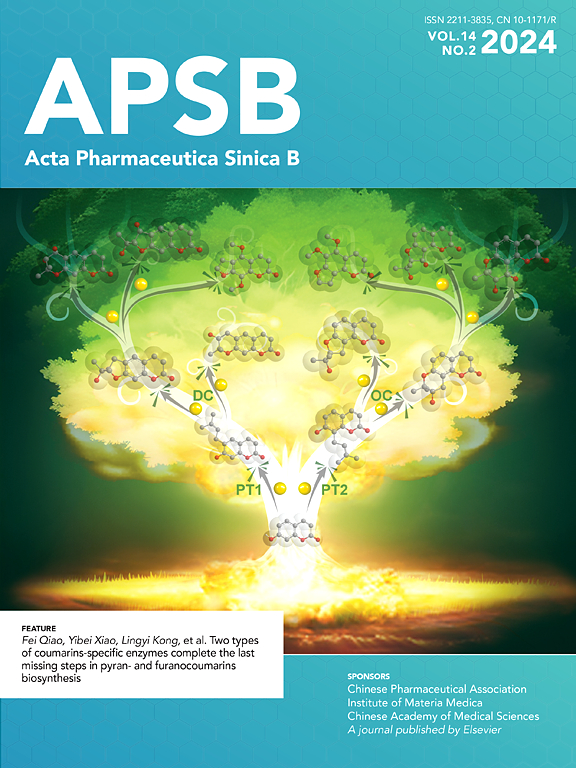A proximity-induced chimera platform for targeted protein arginine methylation
IF 14.7
1区 医学
Q1 PHARMACOLOGY & PHARMACY
引用次数: 0
Abstract
Arginine methylation is a critical post-translational modification that plays multifaceted biological functions. However, the manipulation of protein arginine methylation largely depends on genetic or pharmaceutic inhibition of the regulatory enzymes, protein arginine methyltransferases (PRMTs), or non-methylation substitution of corresponding arginine residue to lysine or alanine of protein of interest (POI), which inevitably affects other substrates, or disrupts the structure of POI. Thus, it urges an approach to specifically modulate the arginine methylation of a POI under physiological conditions. To this end, we report the discovery of a methylation tagging system (MeTAG), that enables targeted modification of protein arginine methylation. Through bridging the methyltransferase PRMT5 proximity to a POI, MeTAG facilitates the arginine methylation of POIs, including known arginine methylated proteins, androgen receptor (AR) and protein kinase B (AKT), as well as a neo-substrate E1A binding protein (p300), in a reversible and PRMT5-dependent manner. Moreover, MeTAG can regulate downstream signaling in a methylation dependent manner, leading to downregulation of PSMA mRNA level and activation of AKT. Therefore, MeTAG represents a feasible approach to modulate protein methylation and thereby perturbs protein function in biological and therapeutic contexts.

靶向蛋白精氨酸甲基化的邻近诱导嵌合体平台
精氨酸甲基化是一种重要的翻译后修饰,具有多方面的生物学功能。然而,对蛋白质精氨酸甲基化的控制很大程度上取决于对调节酶、蛋白质精氨酸甲基转移酶(PRMTs)的遗传或药物抑制,或将相应的精氨酸残基非甲基化取代为感兴趣蛋白(POI)的赖氨酸或丙氨酸,这不可避免地会影响其他底物,或破坏POI的结构。因此,它敦促一种在生理条件下特异性调节POI精氨酸甲基化的方法。为此,我们报告了一种甲基化标记系统(MeTAG)的发现,该系统能够靶向修饰蛋白质精氨酸甲基化。通过将甲基转移酶PRMT5连接到POI, MeTAG以可逆和依赖PRMT5的方式促进POI的精氨酸甲基化,包括已知的精氨酸甲基化蛋白、雄激素受体(AR)和蛋白激酶B (AKT),以及新底物E1A结合蛋白(p300)。此外,MeTAG能够以甲基化依赖的方式调控下游信号,导致PSMA mRNA水平下调和AKT的激活。因此,MeTAG代表了一种可行的方法来调节蛋白质甲基化,从而在生物学和治疗环境中干扰蛋白质功能。
本文章由计算机程序翻译,如有差异,请以英文原文为准。
求助全文
约1分钟内获得全文
求助全文
来源期刊

Acta Pharmaceutica Sinica. B
Pharmacology, Toxicology and Pharmaceutics-General Pharmacology, Toxicology and Pharmaceutics
CiteScore
22.40
自引率
5.50%
发文量
1051
审稿时长
19 weeks
期刊介绍:
The Journal of the Institute of Materia Medica, Chinese Academy of Medical Sciences, and the Chinese Pharmaceutical Association oversees the peer review process for Acta Pharmaceutica Sinica. B (APSB).
Published monthly in English, APSB is dedicated to disseminating significant original research articles, rapid communications, and high-quality reviews that highlight recent advances across various pharmaceutical sciences domains. These encompass pharmacology, pharmaceutics, medicinal chemistry, natural products, pharmacognosy, pharmaceutical analysis, and pharmacokinetics.
A part of the Acta Pharmaceutica Sinica series, established in 1953 and indexed in prominent databases like Chemical Abstracts, Index Medicus, SciFinder Scholar, Biological Abstracts, International Pharmaceutical Abstracts, Cambridge Scientific Abstracts, and Current Bibliography on Science and Technology, APSB is sponsored by the Institute of Materia Medica, Chinese Academy of Medical Sciences, and the Chinese Pharmaceutical Association. Its production and hosting are facilitated by Elsevier B.V. This collaborative effort ensures APSB's commitment to delivering valuable contributions to the pharmaceutical sciences community.
 求助内容:
求助内容: 应助结果提醒方式:
应助结果提醒方式:


